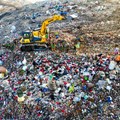The Gauteng Department of e-Government and the University of Johannesburg (UJ) have collaborated to launch the newly established Gauteng e-Waste Management System to tackle the province's mounting e-waste.

Source: Supplied
E-waste refers to the disposal of electrical and electronic gadgets. The e-waste management system is being implemented as a solution to help improve the collection, recycling, and safe disposal of electronic waste (e-waste) in the province.
Gauteng is regarded as the hub of the South African economy due to the various industrial economic activities that take place in the province. This has, however, resulted in the accumulation of e-waste caused by the high use of technological products such as home appliances, mobile phones and computers by residents.
South Africa experiences about 360,000 tons of e-waste each year and Gauteng accounts for about 55% of the national e-waste quantities. A lack of a proper e-waste management system could result in drastic harmful effects on human lives and the environment.
The e-waste management system has therefore been established to help address the challenges of poorly coordinated e-waste management in the province. Apart from helping in educating Gauteng residents on issues of e-waste, the project will also instil a culture of recycling electronics.
Project will ”stimulate the economy”
Gauteng MEC The Department of e-Government Nomantu Nkomo-Ralehoko, who is leading the project on behalf of the provincial government, commented: “Through this project, the Gauteng Provincial Government aims to achieve a sustainable e-waste management solution that will ensure a clean, healthy and safe environment. The e-waste management system will also assist in inspiring creativity amongst the youth, to be able to recycle and create something meaningful from discarded gadgets.”
Professor Saurabh Sinha, the deputy vice-chancellor for research and internationalisation at UJ, says the rapid pace of the fourth industrial revolution has compelled all sectors of society to consider novel solutions to current problems.
“Among other issues, South Africa and Africa as a whole are confronted with massive mountaintops of unused electronic devices, most notably computers (which are either stored, dumped, or imported), as well as tumultuous electrical and electronic waste that is growing at an exponential rate - much faster than Africa's contemporary ICT challenges.
Sinha added that in addition to ensuring a clean, healthy and safe environment, the new system will also “stimulate the economy through supporting SMMEs and job development”.




































